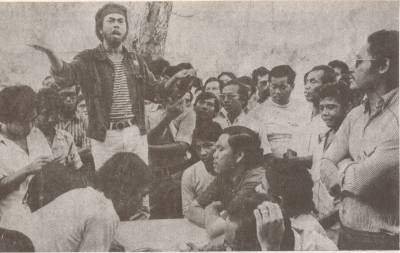TASEK UTARA 1974: STUDENT-SQUATTER SOLIDARITY
The Minister of Education suggested that students should have a guideline of political behaviour. Such a guideline would supposedly be valuable if precise and devised and enforced by the student body as well as by the university authorities.
Reading between and behind the lines, it implied that students should be in favour of the ruling circles, should share their political viewpoints and to ensare this, rules should be used to curb student activities that align them with the oppressed.
Students should just receive professional and academic training to serve those in power. The same editorial claimed: `There is no merit to the view that university students should be servilely beholden to society, that rise each morning pledging their debt to the taxpayer.'
What nonsense! If students are not going to pledge their debt to the real taxpayers - the poor masses, to whom should they pledge their debt? To those in power to help them suppress the masses?
By seeing the pIight of the oppressed masses and the evils of the oppressors, students can learn from such experiences. Tempered by struggles they can better understand, expose and remove the root cause of such injustices.
Conclusion
 The
student struggle to support the just demands of the desti tute squatters
did not end in victory, which might have been achieved if not for the
subversion and terrorism of the anti-people clique, consisting of fascist
students and university authorities on the one hand, and the absence of
well-prepared and organised mass action on the other.
The
student struggle to support the just demands of the desti tute squatters
did not end in victory, which might have been achieved if not for the
subversion and terrorism of the anti-people clique, consisting of fascist
students and university authorities on the one hand, and the absence of
well-prepared and organised mass action on the other.
It is necessary to summarise the experience and to re-examine ourselves in order to win more victories in future struggles:
1. It exposed the real face of those in power. With sweet talk of an `action-orientated' approach to solve national problems, it unleashed the state apparatus (police, Special Branch, courts, jail, etc.) to suppress the poor and those who struggled for the interests of the poor.
2. It added to the list of evidence exposing the farcical nature of democracy in our country.
3. The progressive students were accused by the ruling circles and the NEC of being tools of political party(ies). Both in words and in practice, the progressive students actively supported the people's struggle. The NEC used pro-people slogans to hoodwink the students, but in practice, they were a, gang of antipeople fascists as exposed by their shameful sabotage. These fascists had tried to be more effective in their subversion by iniiltrating the top leadership of the PBMUM and PMIUM** (Overwhelming pressure from PMIUM members led to the sacking of its president and secretary.)

